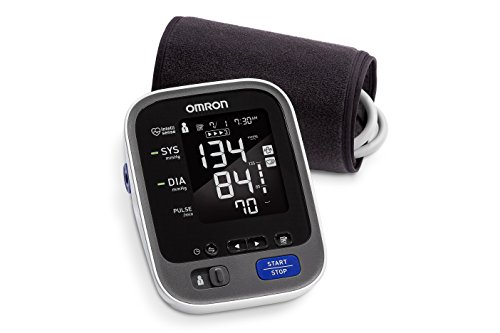Is a blood pressure less than 120/80mm Hg healthier than a higher blood pressure? Scientists randomly assigned 9,361 subjects with systolic blood pressure of 130 mm Hg or higher and increased cardiovascular risk, but without diabetes, to two groups. The intensive treatment group had a systolic blood-pressure target of less than 120 mm Hg while the standard treatment group had a systolic blood pressure target of less than 140mm Hg. This study is known as the SPRINT trial. The end point of the study was the difference in cardiovascular endpoints—heart attacks, stroke, heart failure or death from cardiovascular causes.
The study was stopped early at 3.26 years due to a 27% lowered all-cause mortality rate in the intensively treated group. Furthermore, there was a 25% lowered rate of the primary composite outcome—which is measured by averaging all the cardiovascular outcomes. (New England Journal of Medicine. November 9, 2015)
Comment:
 Omron 7 Series Wrist B...
Buy New $50.98
(as of 01:45 UTC - Details)
Omron 7 Series Wrist B...
Buy New $50.98
(as of 01:45 UTC - Details)
When this study was released, the media released headlines that proclaimed that a lowered blood pressure is better than a higher blood pressure. The New York Times headline stated, “Lower Blood Pressure Guidelines Could Be ‘Lifesaving,’ Federal Study Says.”
Nobody knows what the optimal blood pressure values should be. I can assure you there is not one number that is optimal for everyone at every age. When I was in medical school, I was taught that normal blood pressure rises with age. This is still true. As we age, our arteries become stiffer therefore, we require a higher blood pressure to pump blood to the entire body. It is ludicrous to believe that an 80-year-old should have the same blood pressure as a 20-year-old. Setting blood pressure guidelines for everyone at 120 mm Hg or less guarantees that nearly every adult over the age of 40 will require a blood pressure medication in order to meet these guidelines.
What was not reported in the media was that the rate of serious adverse events including hypotension, syncope (fainting), electrolyte abnormalities and kidney failure were all significantly higher in the intensive versus the standard-treatment group. Each of these adverse events are well-known to occur when too many antihypertensive medications are prescribed and the blood pressure is lowered too much.
 Omron 10 Series Wirele...
Buy New $204.43
(as of 07:00 UTC - Details)
Omron 10 Series Wirele...
Buy New $204.43
(as of 07:00 UTC - Details)
 L-Arginine Essential A...
Buy New $17.97
(as of 05:40 UTC - Details)
L-Arginine Essential A...
Buy New $17.97
(as of 05:40 UTC - Details)
 Sherpa Pink Gourmet Hi...
Buy New $14.99 ($0.19 / Ounce)
(as of 12:25 UTC - Details)
Sherpa Pink Gourmet Hi...
Buy New $14.99 ($0.19 / Ounce)
(as of 12:25 UTC - Details)
 Amazon.com $50 Gift Ca...
Buy New $50.00
(as of 11:05 UTC - Details)
Amazon.com $50 Gift Ca...
Buy New $50.00
(as of 11:05 UTC - Details)





